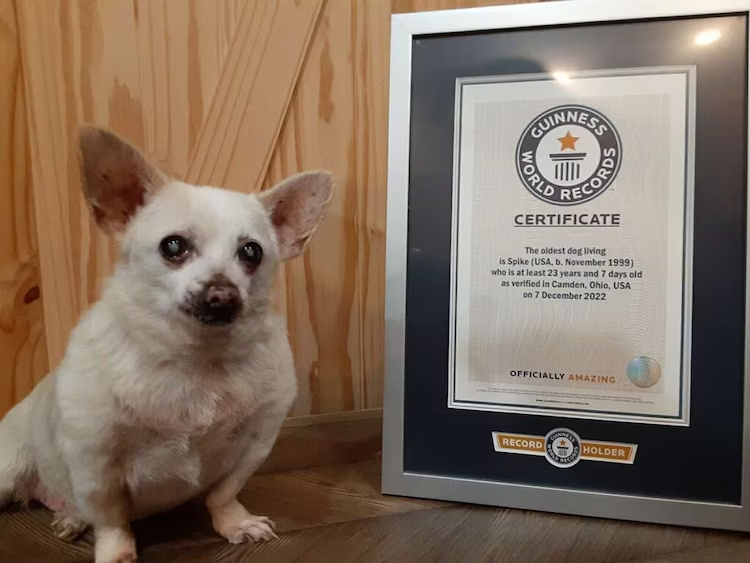How Long Do Chihuahuas Live? Understanding the Chihuahua Life Span

Chihuahuas are known for their long life spans, often outliving larger breeds by several years. With proper care, they can become cherished family members for a significant part of their owners’ lives. Understanding the factors that contribute to their longevity and what can affect their health along the way can help ensure that your Chihuahua lives a full and healthy life.
1. Average Life Span of a Chihuahua
The average life span of a Chihuahua ranges from 12 to 20 years, making them one of the longest-living dog breeds. Their longevity is largely due to their small size, as smaller breeds generally live longer than larger ones. However, a Chihuahua’s life span can vary based on factors such as genetics, lifestyle, and health care practices.
1.1 Typical Life Expectancy
Chihuahuas have an impressive life expectancy, with most reaching 15 years or more if they are well-cared for. This extended life span is primarily due to their small size; smaller breeds typically experience less physical strain on their bodies compared to larger breeds. While some Chihuahuas may live well into their late teens or even early twenties, it’s essential to provide the best care possible to help them reach these ages.
1.2 Factors Contributing to Longevity
Several factors contribute to the Chihuahua’s impressive life span, starting with their genetics. Chihuahuas have been selectively bred for health and resilience over centuries, which has contributed to their longer life spans. Additionally, their compact size and relatively low weight reduce strain on their hearts and joints, which can lead to fewer health issues over time.
Another contributor to their longevity is their natural resilience to certain health conditions that commonly affect larger breeds. Chihuahuas are less prone to joint and hip issues than larger dogs, which means they are less likely to experience the mobility issues that can decrease quality of life in older dogs.
1.3 Variations by Chihuahua Type
Within the Chihuahua breed, there are a few different types, including long-haired and short-haired Chihuahuas, as well as apple head and deer head variations. While these types do not significantly impact overall life expectancy, there are some minor variations. For example, apple head Chihuahuas, known for their distinctively round heads, may be more prone to breathing issues due to their skull structure, potentially affecting longevity if these issues are not managed. However, these differences are typically minimal, and with proper care, all types of Chihuahuas can live long, healthy lives.
| Chihuahua Type | Characteristics | Potential Health Concerns |
|---|---|---|
| Long-Haired | Soft, longer coat that requires regular grooming | Minor skin or coat maintenance issues |
| Short-Haired | Smooth, short coat, easy to groom | Prone to dry skin due to lack of dense fur |
| Apple Head | Round head with a short muzzle | May be prone to breathing issues |
| Deer Head | Longer head and muzzle, resembling a deer’s profile | Fewer respiratory concerns, generally hardy |
2. Key Health Factors Affecting Chihuahua Life Span

While Chihuahuas have a high potential for longevity, their life span can be influenced by various health factors. Understanding these factors helps owners provide the right care and preventive measures to ensure their Chihuahua has the best chance at a long, healthy life.
2.1 Common Health Conditions
Chihuahuas, like all breeds, are susceptible to certain health issues. Among the most common are heart disease, dental problems, and patellar luxation.
- Heart Disease: Heart issues, particularly mitral valve disease, are common in small dog breeds, including Chihuahuas. Regular veterinary checkups are essential to detect and manage heart conditions early, as untreated heart disease can shorten a Chihuahua’s life span.
- Dental Problems: Due to their small mouths, Chihuahuas are prone to dental issues, such as plaque buildup, gingivitis, and periodontal disease. Poor dental health can lead to infections that affect other organs, including the heart. Maintaining a regular dental care routine, such as brushing and professional cleanings, can significantly improve their longevity.
- Patellar Luxation: This condition, where the kneecap dislocates from its normal position, is common in Chihuahuas. It can cause pain and mobility issues, especially in older dogs. If untreated, patellar luxation can lead to arthritis, reducing a Chihuahua’s quality of life and mobility.
2.2 Role of Diet and Nutrition
A well-balanced diet is crucial for maintaining a Chihuahua’s health and preventing obesity, which can lead to numerous health issues. Chihuahuas have small stomachs but high energy needs, meaning they require nutrient-dense food in small portions.
- Balanced Diet: Providing a balanced diet with quality protein, healthy fats, and necessary vitamins helps support immune health, maintain a healthy weight, and promote longevity.
- Avoiding Obesity: Obesity is particularly dangerous for Chihuahuas as it can put excess strain on their heart, joints, and digestive system. Monitoring portion sizes and limiting treats are essential for keeping them at a healthy weight.
- Essential Nutrients: Nutrients like omega-3 fatty acids and antioxidants can support a Chihuahua’s skin, coat, and immune health. Omega-3s help reduce inflammation, which is beneficial for joint health and managing heart disease risks.
2.3 Exercise and Activity Needs
Chihuahuas are active, alert dogs, and regular exercise plays a vital role in maintaining their health. Exercise helps manage their weight, supports heart health, and provides necessary mental stimulation.
- Daily Walks: Even a short daily walk can significantly benefit a Chihuahua’s cardiovascular health and help prevent obesity. Exercise should be moderate and suited to their small size.
- Playtime: Engaging in interactive games keeps them mentally stimulated and helps prevent behavioral issues related to boredom.
- Avoiding Overexertion: While Chihuahuas are energetic, it’s important to avoid strenuous exercise, especially in hot weather, as they can be prone to overheating. Always monitor their energy levels during activity and provide water breaks.
3. Best Practices for Extending Your Chihuahua’s Life Span

By following a few best practices, Chihuahua owners can help extend their pet’s life span and enhance their quality of life. Routine care, a healthy diet, and preventive measures all contribute to a longer, healthier life for Chihuahuas.
3.1 Regular Vet Checkups
Routine veterinary checkups are essential for early detection of any health issues. Regular visits to the vet allow for the monitoring of common Chihuahua health conditions, ensuring early diagnosis and treatment, which can be critical for conditions like heart disease or dental issues.
- Annual Checkups: For adult Chihuahuas, annual vet visits are recommended, with bi-annual visits advised for senior Chihuahuas. These checkups often include blood work, heart checks, and dental examinations.
- Vaccinations and Preventive Care: Staying up-to-date on vaccinations helps prevent diseases that could be life-threatening. Heartworm prevention, flea control, and deworming treatments are also crucial for overall health.
- Weight Monitoring: Regular vet visits are a good opportunity to monitor your Chihuahua’s weight and discuss any dietary adjustments needed to keep them at an optimal weight.
3.2 Dental Health Care
Dental health is especially important for Chihuahuas, as they are prone to dental diseases that can impact their quality of life and shorten their life span. Keeping a Chihuahua’s teeth clean can prevent infections that might spread to other organs.
- Daily Brushing: Regular brushing can significantly reduce plaque buildup. Use a toothbrush and toothpaste specifically made for dogs to keep their gums and teeth healthy.
- Professional Cleanings: Annual professional dental cleanings can help remove tartar buildup, prevent gum disease, and reduce the risk of oral infections.
- Dental Chews and Toys: Dental chews and toys designed to reduce plaque can supplement regular brushing, keeping their teeth clean between brushings and dental appointments.
3.3 Preventative Health Measures
Preventative care can make a significant difference in the life span of a Chihuahua, from grooming to parasite control. Keeping up with these measures minimizes health risks and maintains their well-being.
- Grooming and Skin Care: Regular grooming keeps their coat healthy, and checking for any skin issues or irritations helps detect potential problems early on. Long-haired Chihuahuas, in particular, benefit from regular brushing to prevent matting and skin infections.
- Parasite Prevention: Regular flea, tick, and heartworm prevention are essential for a Chihuahua’s health. Parasites can transmit diseases and compromise a Chihuahua’s immune system.
- Balanced Lifestyle: A balanced lifestyle that includes healthy food, proper exercise, and mental stimulation will keep your Chihuahua engaged, happy, and less prone to behavioral or health issues associated with boredom or anxiety.
4. Signs of Aging in Chihuahuas and Senior Care

As Chihuahuas age, they require specific care adjustments to ensure they continue to thrive. Understanding the signs of aging and adapting their lifestyle to meet their needs can help maintain their quality of life.
4.1 Physical Signs of Aging
Recognizing the physical signs of aging in a Chihuahua is the first step to providing appropriate senior care. As they grow older, they may experience graying fur, reduced energy levels, and changes in mobility.
- Graying Fur: Like humans, many Chihuahuas start to show graying fur as they age, particularly around their muzzle and face.
- Slower Mobility: Joint stiffness, especially from arthritis, is common in older Chihuahuas. They may need more time to get up, lie down, or move around.
- Vision and Hearing Changes: Aging Chihuahuas may experience reduced vision and hearing, which can sometimes make them more cautious or less responsive.
4.2 Adjustments in Diet and Exercise
As Chihuahuas age, their dietary and exercise needs change. Adjusting their routine to match these needs can help support their health and comfort during their senior years.
- Senior Dog Food: Consider switching to a senior-specific dog food, which is formulated to support joint health, maintain a healthy weight, and improve digestion in older dogs.
- Gentle Exercise: While Chihuahuas still need exercise in their senior years, focus on gentle activities like short walks and indoor play to avoid strain.
- Weight Management: Older Chihuahuas are prone to weight gain due to lower energy levels. Keep track of their portions to prevent obesity, which can exacerbate health problems.
4.3 Providing Comfort and Quality of Life
Enhancing the comfort and quality of life for an aging Chihuahua is essential for their happiness. This includes adjusting their environment and providing pain management if necessary.
- Soft Bedding: Provide a cozy, supportive bed to help ease any joint pain and offer a comfortable resting place.
- Pain Management: If your Chihuahua shows signs of arthritis or other painful conditions, consult your vet about pain management options to improve their quality of life.
- Mental Stimulation: Engage them in mentally stimulating activities suitable for their age to keep them active and mentally sharp, such as gentle puzzle toys or short training sessions.
Summary
Chihuahuas are known for their impressive life spans, with proper care often living between 12 and 20 years. Understanding the factors that influence their longevity, from regular vet checkups and dental care to a balanced diet and age-appropriate exercise, is key to helping them live a long, healthy life. As they age, adjusting their lifestyle and care routine can help them maintain a high quality of life and remain cherished companions for years to come. By staying proactive about their health and providing a supportive environment, Chihuahua owners can ensure their pets thrive well into their senior years, bringing joy and loyalty to their families for as long as possible.






